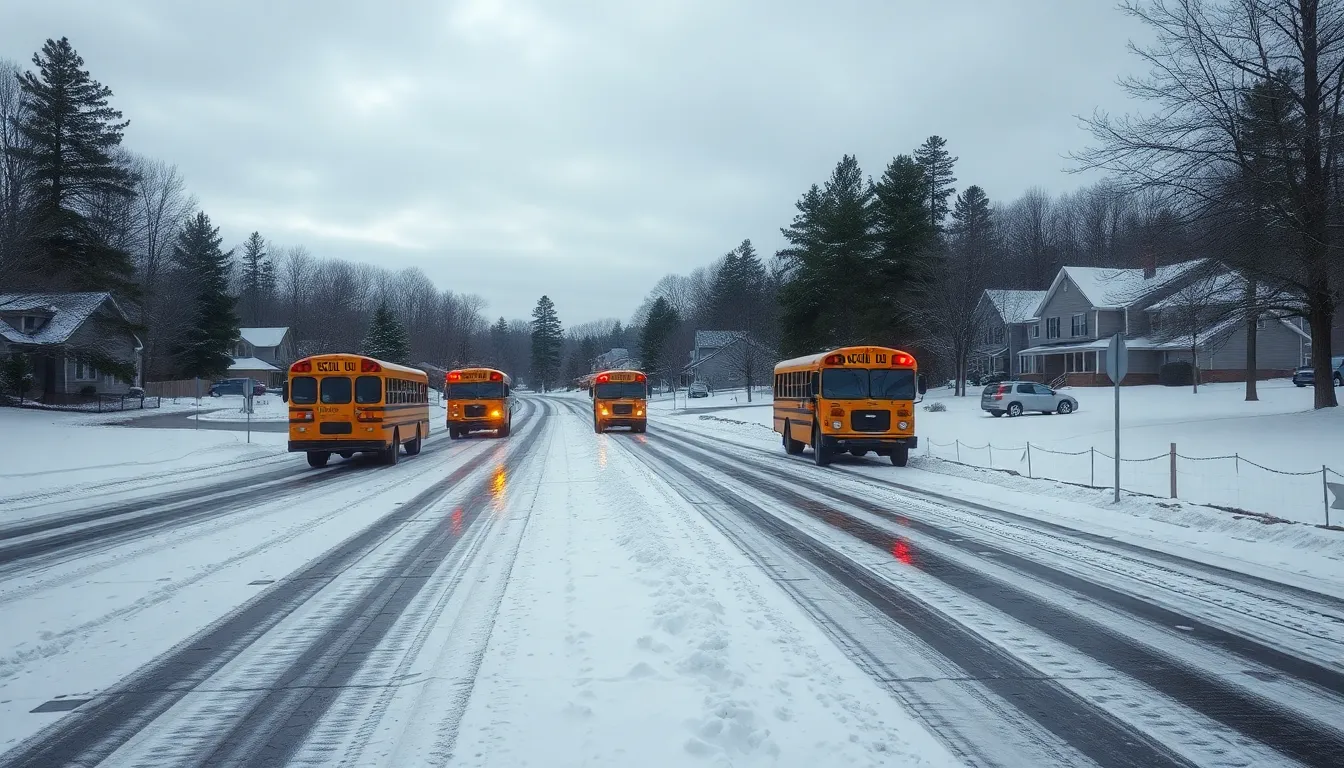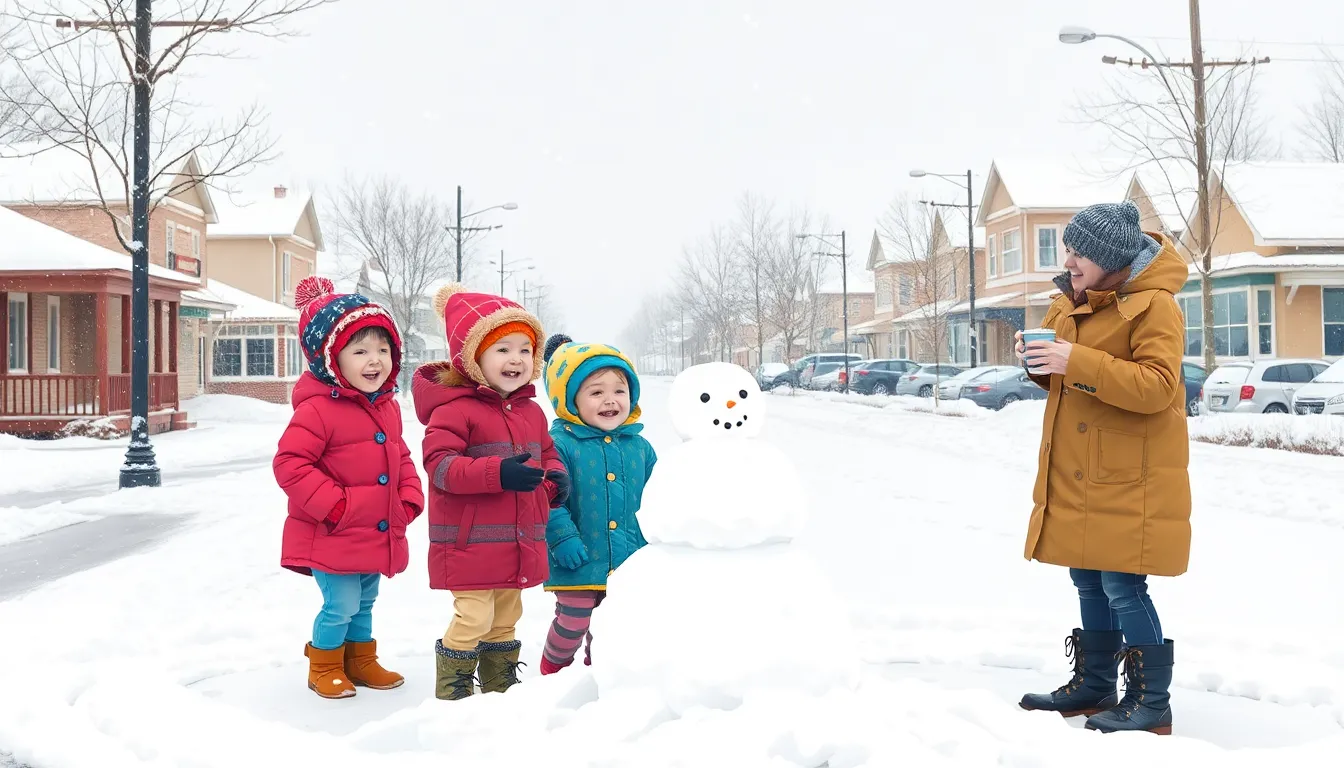February 7 in East Tennessee might just be the day students dream about—snowflakes dancing down from the sky like confetti at a parade. But for parents and teachers, it can feel more like a surprise party they didn’t want to host. As winter storms sweep through, school closures become the hot topic of conversation, and everyone’s left wondering if they’ll need to stock up on hot cocoa or just brace for a day of chaos at home.
Table of Contents
ToggleOverview of East Tennessee School Closures February 7
February 7 brought significant snowfall to East Tennessee. Schools across the region announced closures in response to unsafe conditions. Parents received notifications early in the morning, allowing families to adjust plans for the day.
In Knox County, officials closed all schools, recognizing the potential dangers posed by icy roadways. Sevier County also followed suit, ensuring student safety amid harsh winter weather. Local news outlets reported that the decision was made based on forecasts of continued snowfall and frigid temperatures.
Counties such as Blount, Jefferson, and Loudon experienced similar closures. Many districts opted for virtual learning to keep students engaged while prioritizing safety. Communications from school administrations emphasized the importance of staying off treacherous roads until conditions improve.
Bus routes faced suspensions due to hazardous driving conditions. Areas with hilly terrain encountered particularly challenging situations, prompting school leaders to urge parents to remain cautious. Teachers prepared to shift lesson plans to accommodate changes, providing resources online when possible.
With the unpredictability of winter weather, these closures reflect a common response from educational institutions. East Tennessee families saw the blend of excitement and frustration as they navigated the impacts of the storm. Plans shifted from regular school routines to alternative activities, such as sledding or family time indoors.
As students enjoyed the snow, the focus remained on ensuring safety and maintaining educational continuity. These developments illustrate the community’s resilience in the face of winter challenges.
Reasons for School Closures

Weather events significantly influenced the decision to close schools on February 7. Ongoing winter storms created hazardous conditions that made travel unsafe for students and staff.
Weather Conditions
Significant snowfall blanketed East Tennessee, accumulating several inches in a short period. Reports indicated that some areas faced heavy drifting snow that created further complications. Ice formed on roadways, leading to slick surfaces that posed risks to drivers. Many weather forecasts warned of dangerous travel conditions throughout the day. Schools monitored these weather updates closely, prioritizing the safety of students and staff.
Safety Concerns
Officials prioritized student safety when making closure decisions. Icy roads presented dangers for buses and personal vehicles alike. Community safety also depended on families staying off treacherous roads. Parents received timely notifications, which allowed them to make necessary adjustments to their schedules. Schools encouraged families to avoid unnecessary travel during the storm, emphasizing the importance of safety over attendance. As health and safety remained a foremost concern, educational institutions acted swiftly in response to emerging risks.
Impact on Students and Families
East Tennessee’s school closures on February 7 profoundly affected students and families, prompting necessary adjustments and emotional responses to the unexpected disruptions.
Adjustments to Schedules
Parents quickly adapted their daily schedules due to school closures. With notifications coming early, they found time to plan alternative childcare. Many turned to online learning options offered by local districts, keeping students engaged with educational content. Families also organized indoor activities, utilizing this time to explore hobbies together. Flexibility became essential, as parents worked from home or managed other responsibilities while ensuring their children’s educational needs remained met. These adjustments underscored the community’s ability to respond to changing situations while prioritizing student learning amid the winter chaos.
Emotional and Psychological Effects
Unexpected school closures triggered a mix of emotions among students and families. Joy surfaced for some children fascinated by snow days, yet anxiety arose for parents managing altered routines. Increased household stress became evident, as balancing work and childcare presented challenges for many. Comfort through family bonding emerged as a silver lining, helping to ease feelings of isolation. Social interactions dwindled during closures, highlighting the need for ongoing support systems in the community. Recognition of these emotional impacts emphasized the importance of mental well-being for both students and families during severe weather events.
Rescheduling and Make-Up Days
Many districts in East Tennessee announced rescheduling plans for missed school days due to the February 7 closures. Knox County Schools, for example, designated specific dates to make up for lost instructional time. Sevier County followed suit with its own schedule adjustments to ensure students remain on track academically.
Schools often utilize designated snow days built into the academic calendar. Some districts, however, may extend the school year or add hours to maintain instructional hours. This flexibility helps ensure compliance with state educational requirements.
Virtual learning options have been implemented in several districts. Teachers deliver lessons online, allowing students to continue learning from home during closures. This option enables families to stay engaged with coursework while navigating winter storm challenges.
Communication from school officials remains crucial during this time. Parents receive detailed updates regarding rescheduling and virtual learning opportunities. Staying informed allows families to adjust plans and ensure children are prepared for academic requirements.
While snow days often bring excitement, the impact on education is significant. Students face the need to catch up on missed content upon returning to school. Teachers, therefore, aim to balance fun with learning by planning engaging make-up activities.
Flexibility in scheduling fosters resilience within the community. Families, educators, and students work together to adapt to changing circumstances. Prioritizing educational continuity while ensuring safety reflects a shared commitment to the well-being of all involved.
Community Response and Support
Community members swiftly rallied in response to the school closures on February 7 caused by winter storms. Families, teachers, and local organizations stepped up to offer assistance and resources to those affected. Many parents utilized social media to share updates and coordinate efforts to support students who suddenly found themselves at home.
Local businesses provided solutions by offering activities and programs tailored for children during the snow days. Several community centers and recreational facilities extended their hours, allowing children to engage in safe, supervised activities. Parents took advantage of these resources, knowing their children remained active and entertained while ensuring their well-being.
Schools communicated effectively with families about virtual learning options, emphasizing the importance of keeping students connected to their education. Teachers adapted lesson plans to suit remote learning, ensuring that educational content continued despite the closures. With online platforms, teachers delivered lessons engagingly, allowing students to interact and learn dynamically.
Community leaders recognized the mental strain on families due to disruptions in routines, so they organized initiatives promoting wellness and connection. Local support groups hosted virtual meetings, where parents discussed strategies to cope with unexpected challenges. Families forged stronger bonds, finding comfort in shared experiences and teamwork during the demanding weather conditions.
Educational institutions focused on transparency regarding rescheduling efforts, keeping parents informed about make-up days and instructional adjustments. Communication via email and social media ensured that families could easily access updates, fostering community trust. Collaboration throughout this period highlighted the resilience of East Tennessee families, showcasing their determination to prioritize education and safety while navigating the hurdles of winter weather.
East Tennessee’s school closures on February 7 due to winter storms brought a mix of joy and disruption. While students reveled in unexpected snow days parents and educators faced the challenges of adapting to sudden changes. The community’s response highlighted resilience as families worked together to navigate the situation.
With effective communication from school officials and the implementation of virtual learning options students continued their education despite the closures. Local organizations and community members stepped up to support families ensuring children remained engaged and active. As East Tennessee moves forward the focus will remain on safety and educational continuity fostering a strong sense of community amidst the winter weather challenges.



